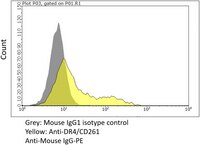MABF3126-25UG Sigma-AldrichAnti-DR4/CD261 Antibody, clone DJR1
Recommended Products
Overview
| Replacement Information |
|---|
| References |
|---|
| Product Information | |
|---|---|
| Format | Purified |
| Presentation | Purified mouse monoclonal antibody IgG1 in buffer containing 0.1 M Tris-Glycine (pH 7.4), 150 mM NaCl with 0.05% sodium azide. |
| Quality Level | MQ200 |
| Physicochemical Information |
|---|
| Dimensions |
|---|
| Materials Information |
|---|
| Toxicological Information |
|---|
| Safety Information according to GHS |
|---|
| Safety Information |
|---|
| Storage and Shipping Information | |
|---|---|
| Storage Conditions | Recommended storage: +2°C to +8°C. |
| Packaging Information | |
|---|---|
| Material Size | 25 μg |
| Transport Information |
|---|
| Supplemental Information |
|---|
| Specifications |
|---|
| Global Trade Item Number | |
|---|---|
| Catalogue Number | GTIN |
| MABF3126-25UG | 04065269802518 |
Documentation
Anti-DR4/CD261 Antibody, clone DJR1 MSDS
| Title |
|---|
Anti-DR4/CD261 Antibody, clone DJR1 Certificates of Analysis
| Title | Lot Number |
|---|---|
| Anti-DR4/CD261, clone DJR1 - Q4012887 | Q4012887 |







